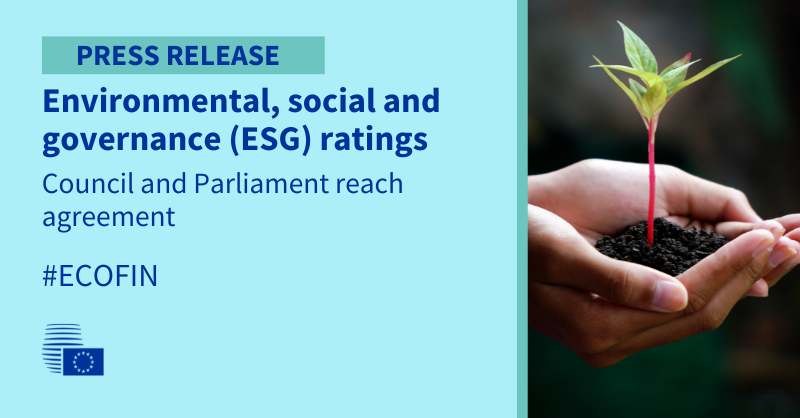EU Boosts Sustainable Investing with New ESG Ratings Regulation

The Council and European Parliament today reached a provisional agreement on a proposal for a regulation on environmental, social and governance (ESG) rating activities, which aims to boost investor confidence in sustainable products.
ESG ratings provide an opinion on a company’s or a financial instrument’s sustainability profile, by assessing its exposure to sustainability risks and its impact on society and the environment. ESG ratings have an increasingly important impact on the operation of capital markets and on investor trust in sustainable products.
“I welcome this agreement. Increasing investor confidence through transparent and regulated ESG ratings can have a significant impact on our transition to a more socially responsible and sustainable future.” – Vincent Van Peteghem, Belgian Minister of Finance
The new rules aim to strengthen the reliability and comparability of ESG ratings by improving the transparency and integrity of the operations of ESG ratings providers and preventing potential conflicts of interests.
Under the new rules, ESG rating providers will need to be authorised and supervised by the European Securities and Markets Authority (ESMA) and comply with transparency requirements, in particular with regard to their methodology and sources of information.
Main elements of the provisional agreement
The Council and the Parliament clarified the circumstances under which ESG ratings fall under the scope of the regulation, providing further details on the applicable exclusions. The agreement also clarifies the territorial scope of the regulation, by setting out what constitutes operating in the EU.
The Council and Parliament agreed that if financial market participants or financial advisers disclose ESG ratings as part of their marketing communications, they will include information about the methodologies used in such ESG ratings on their website. This was done through an amendment of the Sustainable Finance Disclosure Regulation.
The agreement clarifies that ESG ratings encompass environmental, social and human rights or governance factors. The agreement foresees the possibility to provide separate E, S and G ratings. However, if a single rating is provided, the weighting of the E, S and G factors should be explicit.
ESG rating providers established in the EU will need to obtain an authorisation from ESMA. ESG rating providers established outside the EU that wish to operate in the EU will need to obtain an endorsement of their ESG ratings by an EU authorised ESG rating provider, a recognition based on a quantitative criterion or be included in the EU registry of ESG rating providers on the basis of an equivalence decision in relation to the country of its origin and following a dialogue held between ESMA and the relevant third-country competent authority.
The Council and Parliament introduced a lighter, temporary and optional registration regime of three years for small undertakings and groups providing ESG ratings. Small ESG rating providers who opt in under the lighter regime will be exempted of paying ESMA supervisory fees. They will have to comply with some general organisational and governance principles, as well as transparency requirements vis-à-vis the public and users. They will also be subject to the powers of ESMA to request information and conduct investigations and on-site inspections. Upon exiting this temporary regime, small ESG rating providers will need to comply with all the provisions outlined in the regulation, including the requirements regarding governance and supervisory fees.
Related Article: European Council Sets Path for Enhanced Transparency in ESG Ratings
For small ESG ratings providers, the agreement also provides that if the conditions are met, ESMA could decide to exempt an ESG rating provider from some of the requirements but only in duly justified cases and based on the nature, scale and complexity of the business of the ESG rating provider and the nature and range of the issuance of ESG ratings.
The agreement introduces as a principle a separation of business and activities, with a possibility for ESG ratings providers not to set up a separate legal entity for certain activities, provided that there is a clear separation between activities and that they put in place measures to avoid potential conflicts of interests. However, this derogation would not apply to ESG rating providers that carry out consulting activities, audit activities and credit rating activities. ESG rating providers may nevertheless develop benchmarks if ESMA considers that sufficient measures have been put in place to address conflicts of interests.












